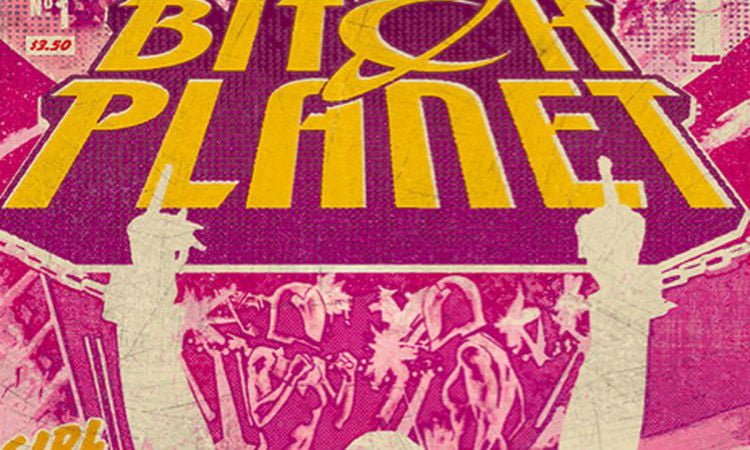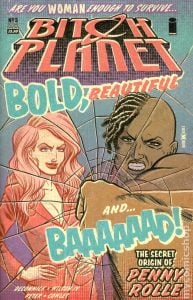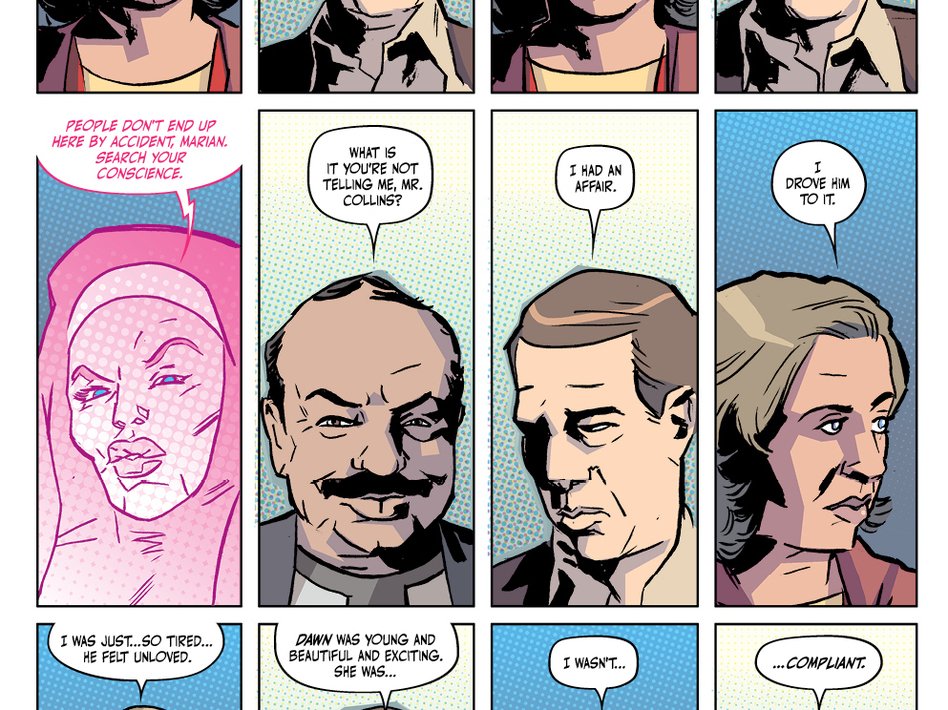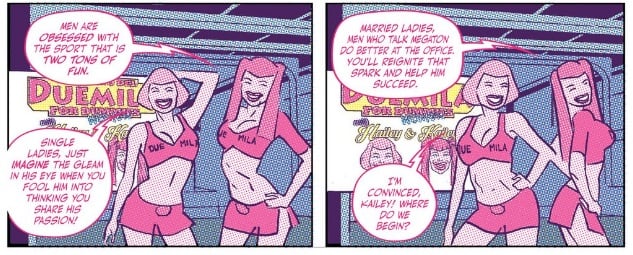
Welcome to the Comic Archive! There have been so many amazing stories, characters, and series produced from comic book publishers for almost 100 years now; this column will serve to celebrate some of the tales you may or may not know about. Each week, we’ll take a story arc or trade paperback/collected story from a non-new comic (three years old or further back), and discuss the details with you.
The subject of race and sexism is a hot-button item these days, and certainly has been for a while, and certainly should have been for longer, for we as a society have gone through long stretches where these issues were not talked about enough, if at all. So when a comic comes along like ‘Bitch Planet,’ it’s always looked at with a bit extra scrutiny than normal: a series with its primary focus on race and/or gender – and in the case of ‘Bitch Planet,’ it’s both rolled into one comic book.
 The series ran for 10 issues, published intermittently by Image Comics from 2014 to 2017, and it spawned a short-lived spin-off series, ‘Bitch Planet: Triple Feature!,’ which ran for 5 issues in late 2017. The series was co-created by writer Kelly Sue DeConnick and artist Valentine De Landro, who met at a fan convention and pledged to work on a new series together. DeConnick, of course, is well known to current comic-book fans as the Marvel writer responsible for transitioning Carol Danvers from her former mantle of Ms. Marvel to Captain Marvel, who is now appearing on the big screen in the Marvel Cinematic Universe in her own self-titled series. (DeConnick actually makes a small cameo in the ‘Captain Marvel’ film, a fun “Easter Egg” for fans.)
The series ran for 10 issues, published intermittently by Image Comics from 2014 to 2017, and it spawned a short-lived spin-off series, ‘Bitch Planet: Triple Feature!,’ which ran for 5 issues in late 2017. The series was co-created by writer Kelly Sue DeConnick and artist Valentine De Landro, who met at a fan convention and pledged to work on a new series together. DeConnick, of course, is well known to current comic-book fans as the Marvel writer responsible for transitioning Carol Danvers from her former mantle of Ms. Marvel to Captain Marvel, who is now appearing on the big screen in the Marvel Cinematic Universe in her own self-titled series. (DeConnick actually makes a small cameo in the ‘Captain Marvel’ film, a fun “Easter Egg” for fans.)
‘Bitch Planet’ is a Mature-rated title, and there are some graphic violence and nudity in the books, but neither are done in a “glorified” way, it all fits with the story being presented. In this piece, I’m reviewing issues #1-5 of ‘Bitch Planet,’ which were collected as the first of two trade paperbacks for the series after it wrapped its run. So admittedly, I don’t know how the story ends yet, but the first half of the series is definitely intriguing, if not a bit heavy-handed on its ideas and moral platitudes. More on that below.
The plot of the series is a take on the “exploitation” all-female prison films of the 1970s, with a futuristic sci-fi twist thrown in for good measure. The series does feature a retro-style ’70s vibe, with hyper-stylized covers for each issue showing off the pop-art-fueled grainy “three-color separation” type of presentation. The story line, however, is set in the future: women who were deemed NCs, “non-compliants” in a heavily male-dominated world, have been taken off of Earth and relegated to the Auxiliary Compliance Outpost, more colloquially known to society as Bitch Planet.

Some of the girls are given a second chance at reintegration into society when a plan is hatched by business executives to give the inmates a team in the upcoming Megaton competition – a football-esque game whose matches between historically all-male teams dominate the television ratings and the culture’s obsession. For the girls, this is a chance to reclaim their place in society and end their imprisonment; for the cold-hearted executives, it’s chance to kill or injure the more troublesome inmates via “accidents” that might happen during their games. Plus, injury and drama are good for ratings, and what’s good for ratings is great for business.
Through all this story are back-stories of the females who are in prison, giving some much-needed humanizing to the characters and showing that many, many females in this society have been wrongfully and forcibly removed from the public for things that may or may not truly be crimes: aggression in retaliation to oppression, being “bad mothers,” and the like. The comic series has elements that it shares heavily with both the Netflix show ‘Orange is the New Black’ (which aired in 2013, before the creation of ‘Bitch Planet) and the Hulu show ‘The Handmaid’s Tale’ (which aired in 2017 but is based on a book from 1985).
The sci-fi elements of this tale add a fairly unique spin on the genre/story being told, but for as many critics who have thoroughly enjoyed the series, others have lamented the fact that ‘Bitch Planet’ may have taken its portrayals of the bad/evil elements and made them too one-dimensional. It’s clear that the series is indicating that, in the context of this story (and perhaps in our real-life society as well), males are a privileged, evil, dominating presence, and that women of color are especially at risk for discrimination and unfair practices. While these ideas are true in several aspects of our present-day society, ‘Bitch Planet’ takes things to the extreme by indicating that there are no exceptions to the rules: every single male in the story is a giant douchebag, and the white women characters are also willful accomplices in keeping down any female character of another race and/or religious background.
It’s such an in-your-face aspect of the story that its presence starts to have the opposite effect of what I imagine the intended outcome was: instead of bringing attention to these very real present-day issues, everything comes across as a ridiculous caricature, and as a result, nothing can be taken too seriously. If satire was the true intention of the series, there is not enough “wink and a nod” style humor and plot embellishment to support this vibe.
While I enjoyed reading the first five entries into the series, these issues outlined above kept me from being completely enamored by the project, and they keep me from being excited enough to rush out and finish the series. I’m confident that other people will get different things out of this story, and I think both the writing by DeConnick and the artwork led by De Landro were mostly enjoyable. For me, it’s not a “must read,” but it’s an intriguing series that I think a lot of people will enjoy overall.
Got a comic, character, or story arc that you’d like to see covered by the Comic Archive? Feel free to list it in the Comments below or send your recommendation directly to me at tony@tonyschaab.com – see you in the funny papers!

